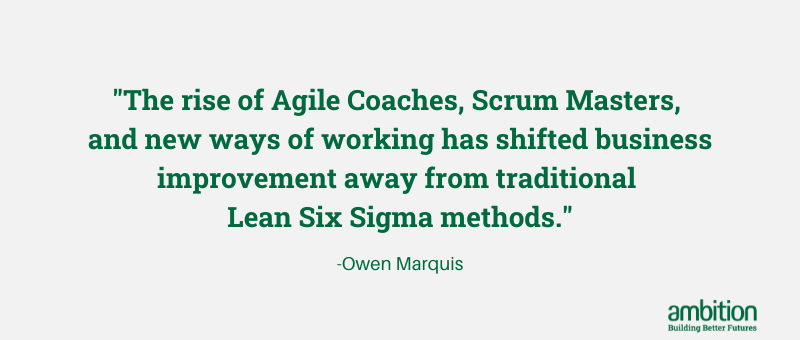Career insights with Ambition podcast
The podcast that dives deep into the defining moments of influential business leaders across technology, accounting and finance.

The podcast that dives deep into the defining moments of influential business leaders across technology, accounting and finance.

The podcast that dives deep into the defining moments of influential business leaders across technology, accounting and finance.

The podcast that dives deep into the defining moments of influential business leaders across technology, accounting and finance.



The rise and fall of the Lean Six Sigma skillset in Australia has been an interesting one to observe and one that I speak about often with practitioners in the industry. When starting my recruitment career in 2017 in the UK, Lean Six Sigma was flying. All the large financial services companies had deployed huge lean programs, trained their operational staff up as yellow or green belts and there seemed to be a strong, global community of business improvement experts developing.
By the end of 2018, I had moved back to Melbourne to continue my recruitment career, and it was a similar story. Many of our large banks and service organisations had lean programs in place and seeing wonderful improvement gains across various end-to-end business processes. All of this coincided with the rise of technology adoption at a large scale along with agile delivery in organisations. That is when the real shift started to happen.
There are many reasons why the Lean Six Sigma skillset is not the same today as it was 15 years ago. I am going to break a few of them down based on what I have seen and heard as a recruiter over the past few years:
According to census data, since 2006 Australia has seen a 25% decrease in jobs in the manufacturing industry. That is approximately a whopping 240,000 jobslost in that time. With manufacturing being a great breeding ground for learning the basics of engineering and Lean Six Sigma, the development of up-and-coming business improvement experts has stunted.
With organisations like Ford and Toyota shifting their manufacturing overseas, this leaves a huge learning and development hole in the business transformation world. For aspiring business improvement experts to be able to go to a place like Toyota, and see first-hand a best-in-class facility and operations is invaluable in their learning and passing on this type of knowledge to the future generation.

With the uptick in large-scale technology implementations such as cloud platforms, ERP systems and HRIS systems, there is much more pressure on delivery teams to get phases of the implementation done quickly, given the huge cost these have on businesses. Lean Six Sigma and traditional waterfall delivery methods have gained a negative connotation of being too rigid and too slow for Australia’s fast-paced economy. Hence the rise of Agile Coaches, Scrum Masters, new ways of working etc.
When speaking with Black Belts in Australia recently about the shift in the Lean Six Sigma skillset, a big part of this comes down to technology and the understanding of a particular piece of software and determining its fit for the business. Whilst technology has always played a big role in the golden triangle of people, process, and technology – its importance in that triangle has grown rapidly. So, if you are a black belt in Australia, your understanding and experience with various platforms will be assessed before you get that new job.
Don’t get me wrong, tighter regulations in these industries are a net positive for the Australian economy and the consumer's personal and online safety. As a Black Belt, working on regulatory projects isn’t the sexiest thing in the world. There have been quite a few candidates I have spoken with over the past six months who have gone into the superannuation industry with the idea of driving business and process improvements but inevitably have been dragged into ASIC-mandated regulatory compliance projects. Now, a job is a job – especially over the past 12 months when the economy has been flat from a hiring perspective. So, these black belts have been sticking it out and delivering what needs to get done, but it doesn’t give them much hope and excitement for future work.

It's not all doom and gloom for Lean Six Sigma professionals. Since 2006, jobs in the mining industry have doubled and many of them are implementing their own lean operating system to standardise operations across many of their sites. Typically a higher-paying industry, this has been a hot zone for business improvement folks to go into in the past few years. The healthcare industry has also seen a high demand for business improvement experts – whether this is looking at the process of how patients are being triaged in emergency wards to how the ward flows from end to end.
Typically, nowadays it’s not just about Lean, Agile, Waterfall or Prince. But it is a blend of them all based on the business environment you walk into. Having a more well-rounded skillset in the workplace is the thing that is going to be more attractive to hiring managers. Can you pick different tools out of your ‘toolkit’ based on what is expected of you, the culture in the business, the types of stakeholders you are dealing with and the business problem you are facing?
While the golden era of Lean Six Sigma may have passed, it is far from obsolete. Professionals who evolve with industry trends, gain technical expertise, and remain flexible in their approach, will continue to find strong career opportunities.
If you're looking for your next opportunity in business improvement or technology, get in touch with me or our team of expert recruiters today.
Author Owen Marquis has been recruiting in Business Transformation and Technology in Melbourne since 2018.
Edited by Melanie Brown, Marketing Executive, Ambition Group Australia.